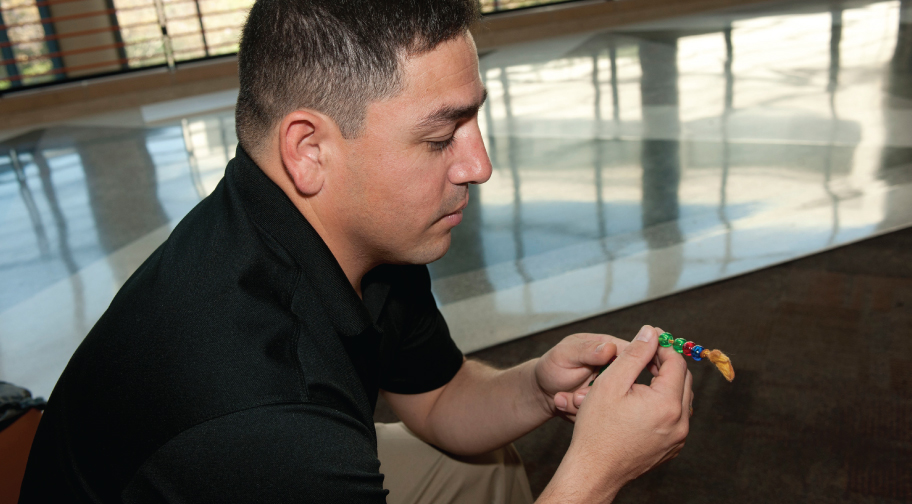
Marty Contreras’ grandmother had a nightly ritual. She would go to a nearby track in the small Texas town of Hamlin carrying a leather strand of beads, about 10 inches long, and pray over each bead as she exercised.
They were her prayer beads, with the red beads representing her five daughters, the green representing her six sons. Marty Contreras became the final bead on her strand—a glowing blue bead—when she adopted him as a 12-year-old.
Although his grandmother died when he was in high school, Contreras held onto those beads. He carried them with him when he went to college. When he enlisted in the Army, he still had the beads.
And they traveled with him to battlegrounds in Afghanistan and Iraq four times over seven years.
“I always have her prayer beads with me,” he said. “They help. I’ve used them for a lot of different things.”
College was a must for Contreras, whose grandparents were hard laborers who sustained their 12 children on $10,000 a year. But when he joined the Army, it was a special point of pride for his grandfather, a World War II veteran.
“He was very proud of the rank that I had accomplished and the things I had done,” Contreras said, gripping the beads.
Contreras’ grandfather died in 2004. By that time his adopted son, an Army medic, had been deployed to Afghanistan as one of the first 50 Americans to arrive in that country after the Sept. 11 attacks. He served there until June 2002. Three months after arriving home, he was deployed to Iraq, where he stayed until August 2003.
In both countries, his team was the tip of the spear in combat; Contreras was the person on the field trying to keep his wounded brothers alive.
“I was the physician on the ground,” he said. “There’s not going to be an emergency room out there. It’s me and a bag. I’ve got to save a life with a bag.”
He was also there to help win the support of the locals. That’s where his grandmother’s beads came in handy.
“They use prayer beads too,” he explained. “I used them at different times when we were moving from one place to another and they saw that and associated it with their prayer beads, which helped me make a connection. That connection went a long way.”
After Iraq, Contreras decided he wanted to be a commissioned officer. He left active duty in 2004 as a sergeant first class and enrolled in the master’s program at UTSA.
“Education is important in my life, so if I could have the chance to get a master’s—in my mind, it was huge,” he said. “It would mean that my grandparents didn’t work their whole lives for nothing.”
While enrolled at UTSA, Contreras enlisted in the national Guard, 20th Special Forces Group. One month later, he was again called to active duty. “I was like, ‘you’ve got to be kidding me,’” he said.
After training in Mississippi for four months, he was sent to Afghanistan. That deployment would end up earning him the Bronze Star for saving the lives of an Afghan couple and their young son. It also helped him earn his commission.
He came back to the U.S. in 2006 and finished his master of science degree in health and kinesiology in 2009. Donovan Fogt, associate professor in health and kinesiology, said he worked closely with Contreras as a student and research assistant. Fogt continues to call on Contreras for help training his classes, he said.
“To think of him going through what he did and now we’re going to bother him with an exam or assignment. … But he never acted like that,” Fogt said. “You ask him for anything and he gets it done on time, perfectly. He acts like it’s water off his back. But he’s got that look in his eyes, like he’s been there.”
Finishing his degree, Contreras already knew he wanted to start his own company, but he needed financing. So once more he traveled to Afghanistan, but this time as a civilian contractor.
“It was a different dynamic, going back as a civilian and getting paid enormous amounts of money,” he said. “But it helped being a soldier and going back because I didn’t have the fear. I feared no one.”
In one week he earned as much money as his grandparents made in a year. It was enough for him and his wife, Angeleen, to start their home health company, MA Medical Services, LLC, which now has 42 employees.
Contreras said he joined the military to pay for college. He got more than he bargained for, he admits, but it helped him to grow. The lessons he learned in school, coupled with the experience he earned on the battlefield, help him run his business today, he said. And it’s helped him build a good life for his five kids.
“Mamaw and Papaw, if they could see me now…” he said, his voice trailing off as he looked again at the beads. Those beads helped sustain him during his Army days. They helped him form a connection with people who lived halfway around the world. And they continue to help him remember his grandparents’ hopes for him and his future. His grandparents pushed him so he could have a better life; he’s pushing himself to make life better for his own children.
“Everything I do, I do for my kids,” he said. “To try to make this world a little bit better for them. It’s all I can do. I have to use this education and this experience to do that. I’ve got to use it—otherwise it was worthless.”
—Lety Laurel